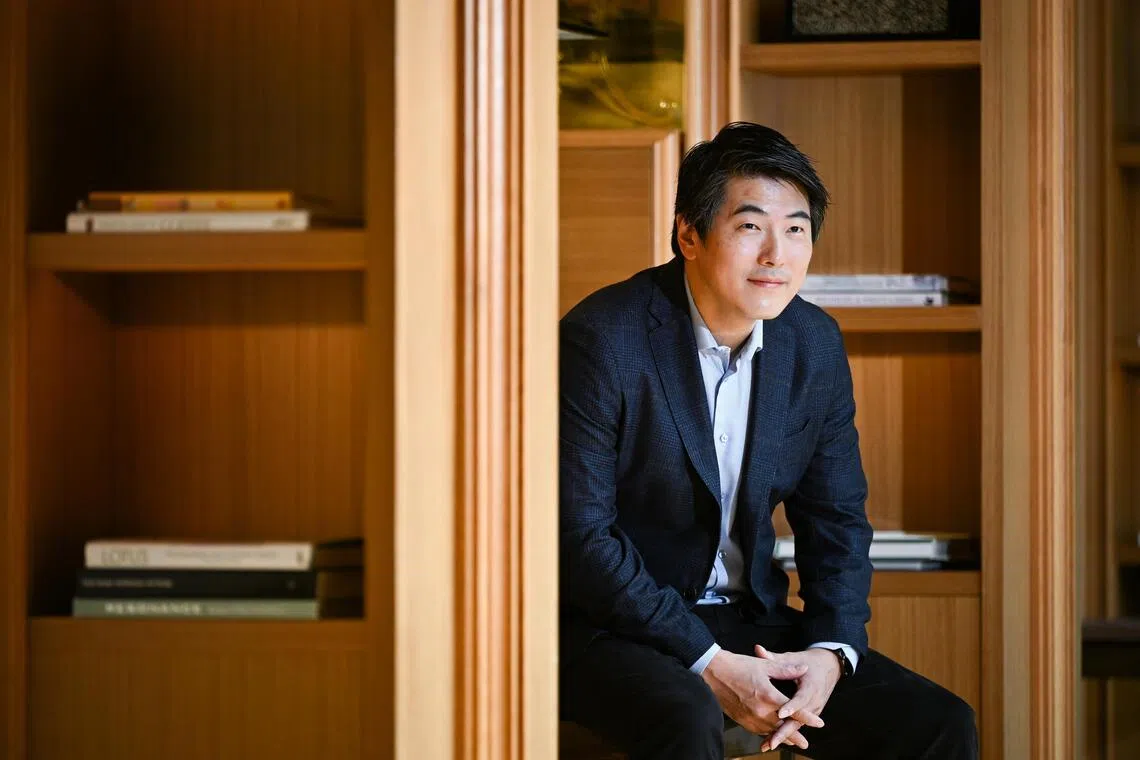OpenAI eyes S’pore as springboard to Asia-Pacific in its global strategy
Sign up now: Get ST's newsletters delivered to your inbox

OpenAI chief strategy officer Jason Kwon said a welcoming government, tech-embracing companies and a high ChatGPT user base drew the company to Singapore.
ST PHOTO: LIM YAOHUI
SINGAPORE – Artificial intelligence (AI) firm OpenAI, whose deals have been hogging the headlines recently, has marked Singapore as a key pillar in its global strategy to be a dominant player in the technology.
It has been setting up its Asia-Pacific base here
The firm would not say how many employees it now has.
The team, with a strong sales focus, has been making inroads into the local market, adding names such as Singapore Airlines (SIA), Grab, Sea and the Singapore Tourism Board to its client wins.
A welcoming government, tech-embracing companies and a large ChatGPT user base drew the San Francisco-based company to the Republic, said its chief strategy officer Jason Kwon in an interview with The Straits Times.
“Asia-Pacific is one of our fastest-growing regions in general – it’s about four times in growth year over year,” he said.
Singapore is one of its top three markets globally for per-capita adoption, said OpenAI. Reports have cited one in four residents here as a user of ChatGPT.
The AI-native company is calling up organisations here, competing directly with its partner Microsoft, with pitches promising multi-modal features, customisation, access to its latest models and researchers, as well as enterprise software that it recently rolled out, or plans to.
Mr Kwon said: “It’s not so much about the models as much as the product that we build around it, the experience around it. So, while users might have access to the same underlying models (using others’ software), we think we do a pretty good job of putting it into a product experience that makes the most out of those capabilities.”
One of the firm’s strengths is its ability to customise solutions, in response to unprecedented use cases specific to generative AI, he said.
“We are a research-driven lab focused on AI. We are not about trying to sell you the most ads. We are not about trying to renew your subscription to a legacy product that you have had for 20 years,” he added.
OpenAI’s partnership with Microsoft, which invested a total of US$13 billion (S$16.9 billion) into the company around the time it burst into the spotlight with ChatGPT in November 2022, is now being renegotiated.
Mr Philbert Gomez, head of Digital Industry Singapore and senior vice-president at the Economic Development Board, said it is significant that OpenAI has signalled its intention to meet customers and partners here.
The firm’s scale, with its large user base, brings opportunities to benefit Singapore’s ecosystem of workers, start-ups and tech firms.
“And since they have an office here, I think we are in a good position to convince them to do more,” Mr Gomez added.
One local company that it has won over is a telco.
Circles’ vice-president of product and AI innovation Gaurav Tandon said he signed on OpenAI to help build an AI-native platform.
Introducing additional software to integrate AI functions into Circles’ existing information technology infrastructure would not have resolved disconnected data and silo systems, he said.
He opted to start a joint road map from scratch with OpenAI, incorporating its upcoming features and language models.
The telco hopes to eventually deliver tailored services to every customer, he said. “For instance, subscribers can ask the AI agents to analyse their travel behaviour and create not just custom roaming plans for subscribers, but also create personalised offers for hotel, flight and activity bookings.”
He added: “OpenAI has been willing to build with us rather than offer us off-the-shelf capabilities, which gives us a lot of confidence in working together with them.”
In April, SIA became the first carrier customer of OpenAI, announcing plans to add the tech firm’s multi-modal prompts in text, audio, diagrams and videos into its customer service, operations and office workflows.
The airline told ST that it chose OpenAI to get early and customised access to cutting-edge AI, and is working closely with OpenAI’s research and engineering teams.
OpenAI has been making waves in recent weeks for a string of deals with the likes of Oracle, Nvidia and AMD
Those deals, estimated to be worth US$1 trillion in 2025 alone, have been struck based on future potential growth of the company over the next several years.
Despite the company suffering operating losses of US$7.8 billion and burning through US$2.5 billion in cash for the first half of 2025, Mr Kwon is optimistic about its prospects.
He said: “We are mostly not profitable because we continue to invest our revenue into building more compute, doing more research and developing products. From a gross margin perspective, we actually are profitable in most markets.”
In the longer term, the firm plans to feature in both consumer and enterprise markets, not unlike Microsoft and Google.
Over 800 million people use ChatGPT weekly, and more than four million software developers have used OpenAI to build apps, said its chief executive Sam Altman on Oct 6.
Mr Kwon said: “You might use particular types of software at home, and they are the same ones you probably want to use at work.
“This is the way in which software has grown over the last 10, 15 years, so it’s important to have the tools exist in those segments.”
Correction note: The story has been updated to more accurately reflect some names and titles.



